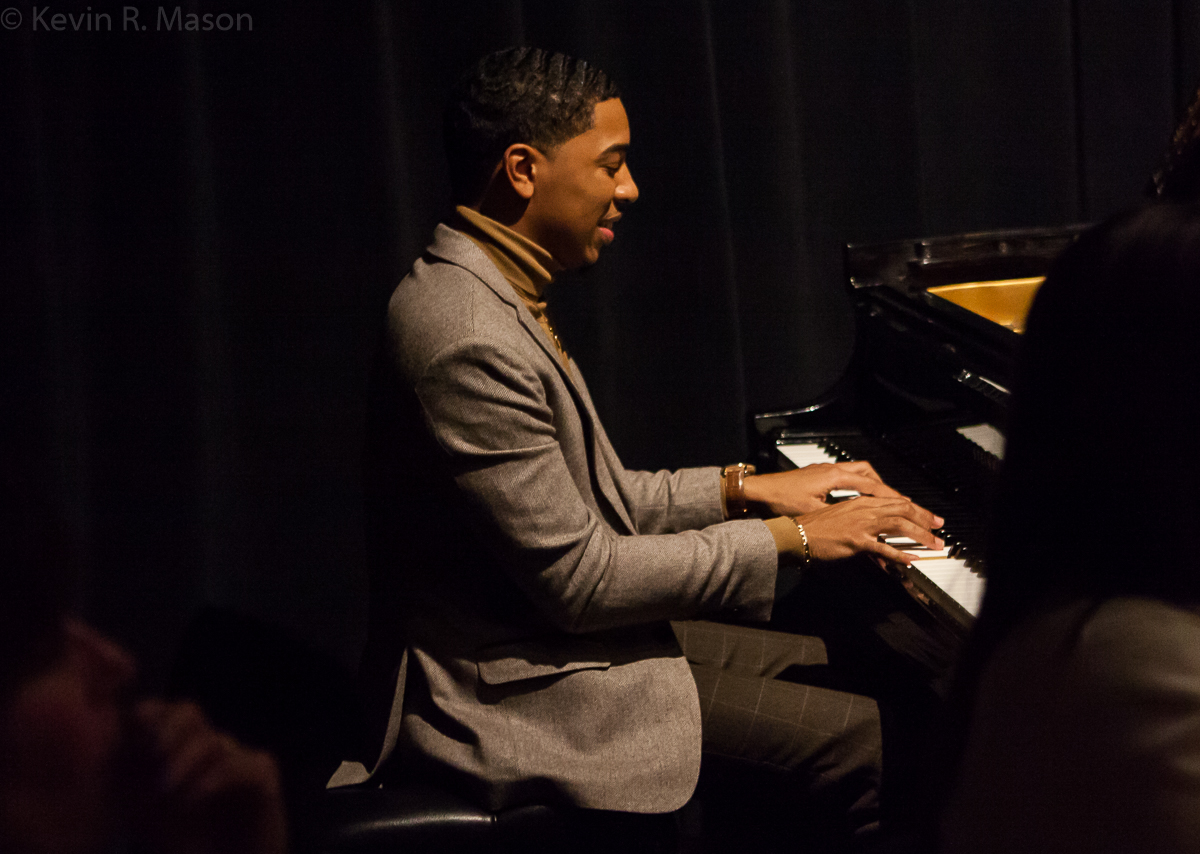
2020 was an unprecedented and challenging year for live, in-person music events. Due to the pandemic, most jazz festivals held in 2020 were presented online. Occasionally, a few live, socially distanced performances took place as a part of jazz festivals, but they were rare. Jazz clubs also resorted to streaming live and pre-recorded concerts, and many musicians started streaming live and taped events from their homes. Often, the shows were free, but the audience members were able to make donations by credit and debit cards, PayPal, Venmo, and other services, to help support the musicians and the different venues. There were also many excellent jazz talks throughout the year, covering a number of topics, including innovative ways musicians and promoters were surviving the shut-downs, and how some artists were using their extra time off by composing new works.
Alas, the jazz world sadly lost many venerable and beloved musicians due to Covid-19 and other causes in 2020, and unfortunately, the normal public funerals and memorials could not be held. Still, despite all the trials and tribulations of the pandemic, people managed to use ingenuity and creative thinking to keep the music going. One of the few benefits of music events being online is that jazz lovers all over the world had unparalleled accessibility and could attend festivals, concerts, and jam sessions almost daily, just by logging onto a website or social media page.
Even with the vaccines now being distributed, it is still unclear how things will play out with live events in 2021. The 2021 Monterey Jazz Festival (MJF) is currently scheduled for September. Perhaps by then, things will be more normalized, and MJF can return to being live.
However, in what became “the new normal” in 2020, the 63rd MJF was held virtually from September 25th to 27th. This is a look back at that virtual edition of MJF, one of the biggest, oldest, and most established festivals in the world. It was a great mixture of live concerts and discussions, as well as numerous taped performances, past and present.
The festivities started with a video featuring artists discussing the MJF, including Joshua Redman, Christian McBride, Quincy Jones, Elena Pinderhughes, and Clint Eastwood, over the backdrop of clips of performances by various musicians from over the years.
MJF Artistic Director Tim Jackson and Executive Director Colleen Bailey welcomed the viewing audience and stated that donations will support the NAACP Legal Defense Fund, the Thurgood Marshall College Fund, and the artists who performed throughout the Festival.
Friday, September 25, 2020
Dianne Reeves
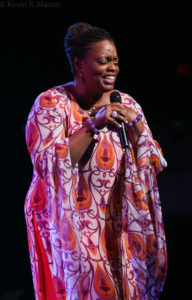
© Kevin R. Mason
Celebrated jazz chanteuse Dianne Reeves got things off to an outstanding start with “Nine,” and she was brilliantly backed by her band, pianist Peter Martin, bassist Reginald Veal, and guitarist Romero Lubambo. Dianne’s exquisite voice swooped and soared, and she scatted like she was born doing it. She talked about being directed by George Clooney in the film Good Night and Good Luck, and what a great experience it was. “One For My Baby” was the last song in the movie, and she said that George was a lover of jazz, which he learned from his aunt, the late, great Rosemary Clooney. Dianne and Reginald did a sultry duet of this song, finishing out this festival-opening set in real style!
Roy Hargrove & RH Factor
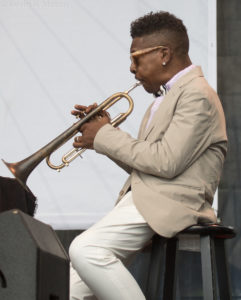
The late, lamented trumpeter/flugelhornist/composer/bandleader extraordinaire Roy Hargrove was shown in a 2002 concert with RH Factor members Keith Anderson on tenor and alto saxophone; Jacques Schwarz-Bart on saxophone and flute; Chalmers “Spanky” Alford on guitar; Raymond Angry on organ; Robert Glasper on keyboards; Reggie Washington on bass; Willie Jones III on drums and percussion; Jason Thomas on drums and percussion; and Renée Neufville on vocals. They started with an impassioned “In a Silent Way/It’s About That Time,” and segued right into a super-hot “Pastor ‘T.” RH Factor was just one of Hargrove’s many collaborations, and they helped to demonstrate how wide an influence he had in the world of music during his lifetime.
Christian Sands
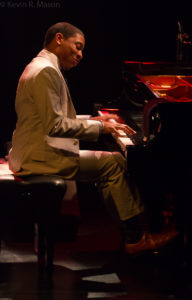
Pianist Christian Sands is the 2020/2021 Monterey Jazz Festival Artist-in-Residence. He said that although things were different this year with a virtual Festival, he has still been having a ball! He has also been involved in a new web series, The Sands Box. Christian played a beautifully pensive piano solo rendition of Steve Winwood’s “Can’t Find My Way Home.”
Terri Lyne Carrington and the Mosaic Project
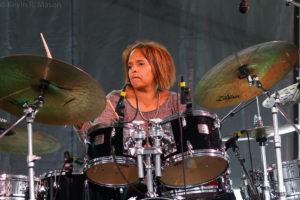
Drummer Terri Lyne Carrington introduced her 2016 Monterey Jazz Festival performance with The Mosaic Project. The set started with the honeyed voice of Lizz Wright on “Open Your Eyes/You Can Fly,” and Lizz was backed by Ingrid Jensen on trumpet; alto saxophonist Tia Fuller; Elena Pinderhughes on flute; Helen Sung on piano; guitarist Ben Eunson; bassist Mats Sandahl; and of course, Terri Lyne Carrington on drums. Next, the group performed “Mosaic Triad, Part 1” and followed with “H-Town Music” where Elena Pinderhughes was rapping to the music. On “Walk With Me Lord,” Lizz Wright was joined by the renowned Valerie Simpson, and they sang a powerfully soulful duet for the final song in this great mini-concert!
Next Generation Jazz Orchestra Directed by Gerald Clayton
Pianist Gerald Clayton joined MJF Executive Director Colleen Bailey, and they discussed his direction of the Monterey Jazz Festival’s Next Generation Jazz Orchestra, including the challenges he faced in putting all the young musicians together virtually. Famous alumni of the MJF education programs include Joshua Redman, Benny Green, Ambrose Akinmusire, and many more! The 2020 Next Generation Jazz Orchestra virtually performed “Big Dipper” from their separate locations, and their musical talent was exceedingly strong! They make the future of jazz seem very promising.
Christian McBride & Inside Straight
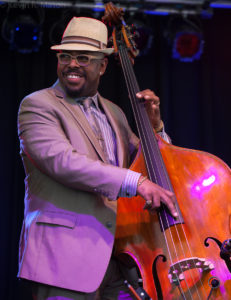
MJF Artistic Director Tim Jackson said, “In 2008, we were very lucky to have bassist Christian McBride as Artist-In-Residence.” Tim noted that Christian brought a group to MJF that was so new, it did not yet have a name. So right at the concert, Christian held a group-naming contest! The group Inside Straight was made up of alto saxophonist Steve Wilson; vibraphonist Warren Wolf; drummer Carl Allen; and leader, bassist Christian McBride. They started with “Whirling Dervish,” where there were some fabulous solos. The group’s collective improvisational skills added new imaginative accents to every phrase. The second song was a tight performance of “The Shade of the Cedar Tree.”
Jamie Cullum

In 2008, singer/pianist/songwriter Jamie Cullum had his first appearance at MJF. Jamie was supported by Tim Lefebvre on bass and Mark McClean on drums. Cullum started “Singin’ in the Rain” with one of his trademarks, playing the top of the piano like a drum, then he launched into a haunting, minor-key performance of the song. This was followed by an equally haunting and emotional “Umbrella.” It was a very intimate and touching set.
Herbie Hancock
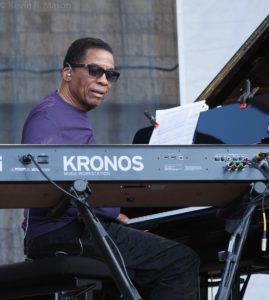
Famed keyboardist/composer Herbie Hancock introduced his set, saying, “I’ve been a part of the Monterey Jazz Festival family since 1963, when I first performed at the fairgrounds with the Miles Davis Quintet.” During the 2017 MJF, Herbie was accompanied by Terrace Martin on alto saxophone and keyboards; Lionel Loueke on guitar; James Genus on bass; and Vinnie Colaiuta on drums. They began with a superb performance one of Hancock’s most recognizable compositions, “Cantaloupe Island,” with each player shining like a polished gem. Then, Herbie got up from the piano to play “Chameleon” on his keytar, a hand-held electronic keyboard. Hancock seemed particularly energized by the keytar, playing it for all he was worth, and being matched note for note by his musical cohorts. At the end, Herbie jumped up and down several times like a man half his age, clearly pumped by his excellent performance, and delighting the audience.
Saturday, September 26
Regina Carter
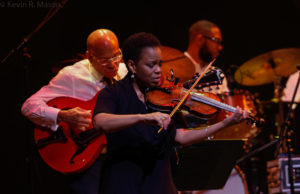
The evening started with a video of longtime fans talking about all the years they attended the MJF, and the different experiences they had. Then, Tim Jackson and Colleen Bailey welcomed the viewers. Tim said, “While we very much miss seeing you at the Monterey Fairgrounds and experiencing the fantastic artists we’ve watched there over the last 62 years, we hope this weekend of performances…you will experience virtually will inspire you, soothe you, refresh you, and help you through some of the difficult times we’re facing right now.”
Acclaimed violinist Regina Carter’s 2017 concert had Regina giving, as introduction, the background of Hoagy Carmichael’s “Judy,” the song Ella Fitzgerald sang to win the Apollo Amateur Night as a teenager. Next, Regina and guitarist Marvin Sewell did a beautiful duet of Marvin’s arrangement of “I Can’t Believe That You’re in Love With Me.” Regina was also joined by Xavier Davis on piano, organ, and Fender Rhodes; Chris Lightcap on bass; and Alvester Garnett on drums, and the group’s communication was amazing! The song ended with a snippet of “I’m So Glad We Had This Time Together,” and the audience’s ovation was explosive!
Next Generation Women in Jazz Combo Directed by Katie Thiroux
Pianist Gerald Clayton introduced the group Next Generation Women in Jazz Combo and said that the young musicians recorded their tunes especially for the 63rd MJF. “Daahoud” was composed by Clifford Brown, and arranged by the group’s bassist, Zoe Harrison. In addition to Zoe Harrison, the group was composed of Kellin Hanas on trumpet; Gianna Pedregon on violin; Parthenope Wald-Harding on saxophone; and Carmen Murray on drums, under the direction of vocalist/bassist Katie Thiroux. These young women were each performing from their separate locations, but they played together magnificently, despite the distance. “When It’s Sleepy Time Down South” was composed by Clarence Muse, Leon René and Otis René, and arranged by trumpeter Kellin Hanas.
Next Generation Jazz Orchestra Directed by Gerald Clayton
The socially distanced big band, under the direction of Gerald Clayton, played a swinging version of “I’m Beginning to See the Light” with stand-out vocals by Maggie Kinney. The rest of the group were: saxophonists Ian Munoz, Thomas Schinabeck, Daiki Nakajima, Nick Caldwell, and Adam Zilberman; trombonists Ilai Macaggi, Jackson Spellman, Riichiro Fujiki, Nate Gilbreath, and Jack English; pianist Isaiah Harwood; guitarist Satchel Moore; bassist Ahmed McLemore; drummer David Lee; and vibraphonist Jackson Hanks. This young group of musicians already shows great promise.
Davina and the Vagabonds
Davina and the Vagabonds’ rollicking 2016 MJF performance of “Lipstick and Chrome” had pianist/composer/vocalist Davina Lozier joined by trumpeter/vocalist Zack Lozier; Steve Rogness on trombone; Andrew Foreman on bass; and Connor Hammergren on vocals and drums. Davina and the Vagabond’s set was like a trip to the world’s greatest honky-tonk bar.
Clint Eastwood in Conversation with Tim Jackson
Actor/director Clint Eastwood has been a member of the Board of Directors of the MJF for the past 28 years. Tim Jackson said, “As a film icon and lifelong jazz fan, and decades-long resident of the Monterey Peninsula, Clint has been a huge supporter of the Monterey Jazz Festival and our programs. This year marks the 50th anniversary of Clint’s directorial debut of the movie, Play Misty for Me, with many scenes that were filmed at the Monterey Jazz Festival. I was fortunate to be able to catch up with Clint and have a phone conversation with him about those days.” Clint came to the first MJF, and he has been to almost every Festival since then. Eastwood was supposed to be at the live MJF this year with his son, bassist Kyle Eastwood, but obviously, the pandemic changed that.
Tim and Clint discussed how jazz has influenced his films, including Bird. Eastwood was also Executive Producer for Thelonious Monk, Straight, No Chaser. Clint noted that jazz has been a big part of the soundtracks of many of his movies, and he said that he likes using music that he loves. He said that the film Play Misty For Me was written to be in Los Angeles, but he thought it was too big a town for the movie. Therefore, he decided to move it to Monterey and to include the MJF as a part of the film. Eastwood also talked about his experience working with Forest Whitaker, who played Charlie “Bird” Parker in the film Bird, and how Forest learned quite a bit about playing the saxophone for the role. When asked about his next film, Clint said that everything is pretty quiet right now, but he does have a couple of projects in mind. He added that we all have to stay safe so we can be around next year. Eastwood finished by saying, “Fortunately, jazz will always be here, if we can be a part of keeping it here forever…for generations to come along.”
Eastwood at Monterey with Diana Krall & Kenny Barron Trio
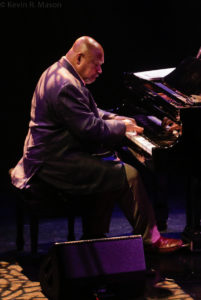
This 1999 concert was the first “Eastwood at Monterey” program. Clint Eastwood introduced the concert, saying, “Welcome, fellow jazz lovers and students of the great American art form.” Clint said that jazz has played a big part in movies for many, many years, and he reminisced about being at MJF years earlier, filming Cannonball Adderley performing “Mercy, Mercy, Mercy!” for the movie Play Misty For Me. Pianist Kenny Barron, bassist Ray Drummond, and drummer Ben Riley played a marvelous and moving “Misty.”
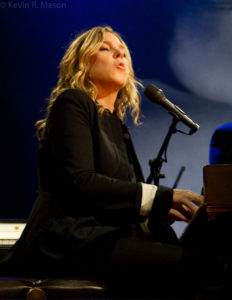
Pianist/vocalist Diana Krall came on stage and said, “I’m very honored to tell you that this next song was written by my friend, Mr. Eastwood.” The song was “Why Should I Care,” and it was featured in the Eastwood film, True Crime. Krall played and sang in a very personal way that made for an effective and poignant performance.
Berklee Institute of Jazz & Gender Justice Quintet
Colleen Bailey talked about MJF’s educational initiatives, due in part to great collaborations with organizations like Berklee College of Music. Twenty-four years ago, MJF established the Jimmy Lyons Scholarship, named for MJF’s founder, Jimmy Lyons. Colleen welcomed two representatives from Berklee, Kim Perlak, the Chair of the Guitar Program, and Cheryl Bailey, the Assistant Chair of the Program. They announced that the winner of the 2020 Jimmy Lyons Scholarship (tuition-free, full-ride) is guitarist Rianna Kopcho from Omaha, Nebraska. Then, the Berklee Institute of Jazz & Gender Justice Quintet, under the direction of drummer Terri Lyne Carrington, was introduced: Veronica Leahy on saxophone; Milena Casado Fauguet on flugelhorn; Camila Cortina Bello on piano; Wenjun Wu on bass; and Ivanna Cuesta Gonzalez on drums. The first song they played was pianist Camila Cortina Bello’s “Black Swan Dance,” followed by saxophonist Veronica Leahy’s “2020.” This talented group of students are already amazingly accomplished at their young ages, and it will be interesting to see where their careers take them.
Our Native Daughters
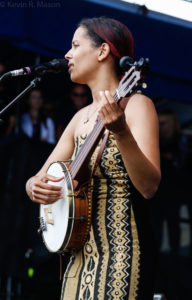
The group Our Native Daughters was supposed to appear live at the 2020 MJF, and since there was no archival footage of them, they recorded a special performance from each of their homes. Banjo and guitar players Rhiannon Giddens, Amythyst Kiah, Leyla McCalla, and Allison Russell performed a heartfelt “I Knew I Could Fly.” This was a composition by Leyla McCalla and Allison Russell in tribute to singer/Piedmont blues guitarist Etta Baker. Leyla McCalla said she hopes the viewers will enjoy the song, and added, “Take care of yourselves, wear your masks, wash your hands, and we’ll see you down the road.”
Tribute to Dave Brubeck with Cannery Row Suite featuring Kurt Elling & Roberta Gambarini
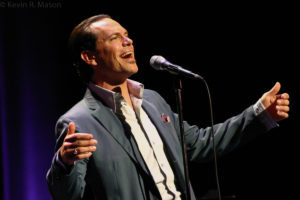
Composer/multi-instrumentalist Chris Brubeck talked about his parents, Dave and Iola Brubeck’s larger-than-life performance at the 2006 MJF of the commissioned project, “Cannery Row Suite.” This endeavor was a musical treatment of the John Steinbeck novel, Cannery Row. It starred singers Kurt Elling and Roberta Gambarini, as well as Chris’ group Triple Play, with multi-instrumentalist Peter Madcat Ruth, and guitarist/vocalist Joel Brown. This show has not been seen since it first debuted at MJF, and Chris said he was proud to share some highlights.
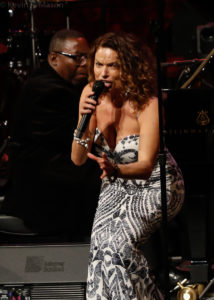
Thomas M. Steinbeck, John Steinbeck’s son, was the narrator; Russell Gloyd was the conductor, with Dave Brubeck on piano; Bobby Militello on alto sax and flute; Michael Moore on bass; and Randy Jones on drums. From the University of the Pacific, Christopher Kong was Chorus Master, with vocalists Kevin Atkinson, Jesse Barrett, Jonathan Napier-Morales, Jeff Oliveira, and Justin Witt. Glen Zaleski was on electric piano; James Haffner was Stage Director; and Randall A. Enlow was Set Director. The show was a stunning, striking example of storytelling set to music.
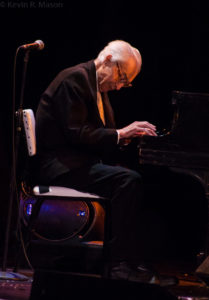
The concert included a passionate “Dora’s Song” performed by Roberta Gambarini, with a superlative piano solo by Dave Brubeck, and Dave beamed at the end of the song. Kurt Elling finished the set with “Doc’s Song” where he poured his heart into the music. This multi-musician collaboration was most impressive.
Sunday, September 27
The last night of the 2020 MJF started with a video filled with breathtaking aerial views of Monterey, California. Then Colleen Bailey and Tim Jackson returned to welcome the viewers.
Sonny Rollins 90th Birthday Tribute
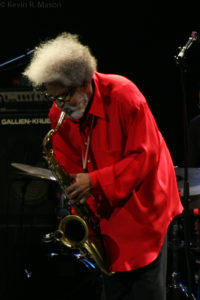
Esteemed saxophonist Sonny Rollins appeared several times over the years at MJF, and although he couldn’t be there in 2017, Rollins gave his approval for the concert in his honor. The group was saxophonist Jimmy Heath; multi-instrumentalist Joe Lovano; saxophonist Branford Marsalis; saxophonist Joshua Redman; pianist Gerald Clayton; double bassist Scott Colley; and drummer Lewis Nash. They played “Tenor Madness,” and boy, did these cats wail! It was like a master class of musical virtuosity, both on their group efforts and their superb solos.
2020 Next Generation Jazz Orchestra
Under the direction of Gerald Clayton, once again the 2020 Nest Generation Jazz Orchestra performed. The group members performed from their individual locations, and they played their hearts out on “Trapezio.” Gerald Clayton certainly did a fabulous job with these talented young artists.
Anat Cohen Tentet
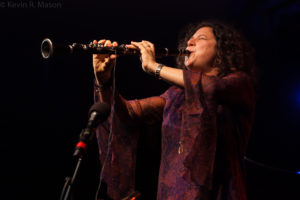
At the 2018 MJF, the much-lauded clarinetist/saxophonist/bandleader Anat Cohen and her Tentet started out with the aptly named “Happy Song,” which was an upbeat delight. The group was made up of Musical Director Oded Lev-Ari; Nadje Noordhuis on trumpet and flugelhorn; trombonist Nick Finzer; Owen Broder on baritone saxophone and bass clarinet; Chris Hoffman on cello; guitarist Sheryl Bailey; Gary Versace on piano and accordion; James Shipp on vibraphone and percussion; bassist Tal Mashiach; and drummer Anthony Pinciotti. After the lively first song, they changed the tempo and played the elegiac “Valsa Para Alice.” Each member of the group got their moment in the spotlight during this set, and they all deserved it with the excellence of their playing.
Angela Davis in Conversation with Terri Lyne Carrington
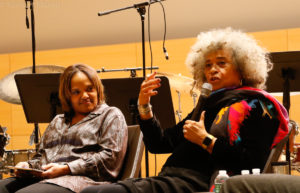
Drummer Terri Lyne Carrington called social activist Angela Davis a friend, a mentor, and someone she has looked up to for a long time. Angela complimented Terri on winning the DownBeat Jazz Poll in three categories. Angela also sang Terri’s praises for her efforts in transforming the world of jazz so that there is more equality for women. Carrington spoke about how much mentorship was important in her career, so she tries to provide that for younger musicians whenever possible. She also tries to make sure her groups are multi-generational. The two also talked about racism, sexism, the protests that have been occurring, and the need for substantive change. Angela said she loves the slogan of Terri’s organization, Berklee Institute of Jazz and Gender Justice, “Jazz Without Patriarchy.”
The illuminating talk was followed by a short discussion between Colleen Bailey and Laura Zehm, the first female Board Chair of MJF. Laura said she has experience being a part of a group that is sometimes underrepresented. They spoke of the need for more diversity, and the importance of making jazz and education available to everyone, regardless of race, gender, or economic status.
Gerald Clayton Quartet
Pianist Gerald Clayton had been seen throughout the weekend, introducing groups that he directed. This year, he and guitarist Anthony Wilson, bassist Alan Hampton, and drummer Jonathan Pinson got together and recorded music just for this broadcast. The set consisted of “Evidence,” “How Deep is the Ocean,” and “Rejuvenation Agenda.” The musicians were socially distanced and masked in a studio in Los Angeles. Gerald and his group put a lot of feeling into their playing, and they took the viewers on an exciting and emotional musical journey.
Cooking Demonstration By Lila Downs From Her Home in Oaxaca
Singer/songwriter/guitarist/actress Lila Downs said that although this year’s Festival is virtual, she is looking forward to making her MJF debut next September, in 2021. Lila said that food is an important component of MJF, and since food really inspires her, she cooked one of her favorite recipes, Placitas Al Chile. Most of the ingredients are local to her home in Oaxaca, Mexico, or from nearby towns. From her beautifully appointed kitchen, Lila’s cooking looked so delicious, it could make your mouth water, just looking at it!
2012 Monterey Jazz Festival on Tour
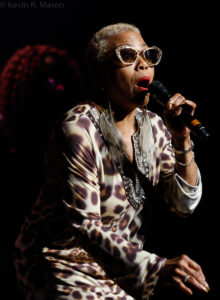
Back in 2007, the MJF celebrated its 50th anniversary. Tim Jackson said, “During that time, we were looking for ways to leverage the brand of the MJF. One of the concepts we came up with, that continues to this day, is the “Monterey Jazz Festival on Tour.” This is where we take a group of all-star, multi-generational musicians, have them perform at the MJF, and then they go out on the road and perform in communities throughout the country.”
In 2012, Musical Director Christian McBride and vocalist Dee Dee Bridgewater performed a Horace Silver composition, “Filthy McNasty.” Christian and Dee Dee were joined by trumpeter Ambrose Akinmusire; tenor saxophonist Chris Potter; pianist Benny Green; and drummer Lewis Nash. Dee Dee looked striking with a closely cropped head, and a statement necklace. Her singing was just as striking as her appearance, and all the players’ red-hot solos were the perfect accompaniment to Bridgewater’s marvelous scatting.
2018 Monterey Jazz Festival On Tour
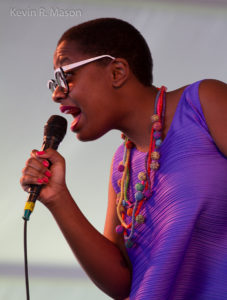
In 2018, Musical Director Christian Sands and singer Cécile McLorin Salvant played Salvant’s composition, “Fog.” The band was comprised of trumpeter Bria Skonberg; tenor saxophonist Melissa Aldana; bassist Yasushi Nakamura; and drummer Jamison Ross. The brightly clad Cécile is a gifted musical storyteller, and she had the audience at the venue in the palm of her hands, as well as no doubt the viewers of this virtual Festival. Salvant got great support from her fellow musicians in this remarkable set.
Tribute to Quincy Jones, “The A&M Years”
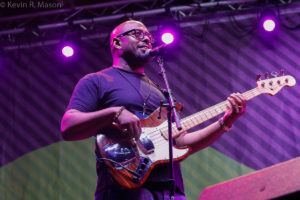
Tim Jackson said he has always been enamored by the big band music of Quincy Jones, especially Quincy’s recordings on the A & M Label in the late 60s and early 70s. In 2016, with Quincy’s permission, Tim approached Christian McBride, who served as Musical Director. John Clayton was the conductor, and they assembled a group of musicians, including several who were on the original recordings: composer/vocalist Valerie Simpson; trumpeters Gilbert Castellanos, Dan Fornero, Sean Jones, and Bijon Watson; trombonists Ryan Dragon, Juliane Gralle, Andy Martin, Art Velasco; Wendell Rider and Bethany Zare on French horns; Forrest Byram on tuba; Hubert Laws on flute; alto saxophonists Adam Schroeder and Bob Sheppard; tenor saxophonists Tom Peterson and Rickey Woodard; James Carter on baritone and soprano saxophone; pianist Dave Grusin; Alfredo Rodriguez on piano, Fender Rhodes, and keyboards; Paul Jackson, Jr. on guitar; bassists Christian McBride and Richard Bona; Lewis Nash on drums; Grégoire Maret on harmonica; and Lynne Fiddmont, Valerie Fiddmont, and Tammi Brown on background vocals.
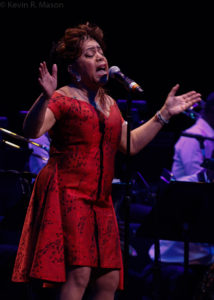
Clint Eastwood introduced Quincy Jones, and it must have been cold in Monterey that evening, because Quincy was really bundled up in a coat, wool hat, and a scarf! However, the crowd was warm, and Jones thanked the audience for “making an 83-year-old feel 43!” The band started with Quincy’s magnum opus, “Gula Matari,” featuring Valerie Simpson’s dramatic and expressive vocals, and several fine solos, including Grégoire Maret’s harmonica riffs, Dave Grusin’s keyboard grooves, Richard Bona’s bass licks, and some excellent playing from the brass section.
Christian McBride brought Quincy Jones up from the audience to conduct Benny Golson’s classic composition, “Killer Joe.” The musicians were at the top of their game, and it really was an extraordinary and fitting ending to the Virtual 2020 MJF!
Despite these strange times, MJF really brought it with outstanding music from archival recordings and new performances. The Festival included established stars, some artists whom we’ve sadly lost but have not forgotten, some interesting interviews, and many up-and-coming young musicians. It was an immensely enjoyable three days. Many of the sets from the 2020 MJF can still be seen on YouTube.
Sponsorship
Partners and sponsors for the 2020 MJF include: DownBeat Magazine; Inns of Monterey; Yamaha; Berklee College of Music; North Coast Brewing Co.; Kaiser Permanente; District 7; and California State University, Monterey Bay.
The 64th Monterey Jazz Festival
At this point, the 2021 MJF is scheduled for September 24th to 26th. For more information about the Monterey Jazz Festival, go to: www.montereyjazzfestival.org.








